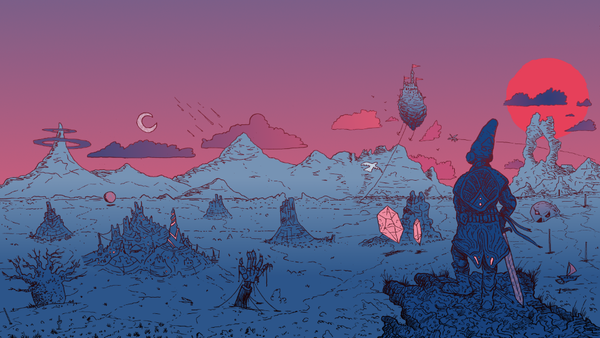Why be a games website in 2025?
In many ways, 70% Complete is designed to be a gateway. As Logan and I discussed the name and the mission, we both came at it from different angles, but we both wanted something that was new. Different. Something that reflected what we love about games and media coverage, as well as the groups of friends who make the stuff we enjoy everyday.
In many ways, 70% Complete is designed to be a model. When we set out to (re)start this whole endeavor, we wanted to model what a long lasting male friendship can look like. How two men separated by a time zone can maintain a relationship discussing the things we love, even though our interests overlap, but aren’t the same. We want to introduce each other to the things we love: Logan with philosophy and me with Mass Effect or some such (still working on that one).
In many ways, 70% Complete is designed to be someone’s first. Someone’s movement from 0 to 1. Whether that’s in topics like data privacy, Star Trek, or roleplaying games, we have always thought of this project as a way to introduce you to something new. So many of the ideas we have for where this thing goes revolve around the idea of looking through new lenses, finding new things, exploring new genres or mediums, and talking to new people. It’s never been just about games, but games are such a flexible medium for talking through so much to people who may not be exposed to non-games coverage.

I recently listened to an episode of Giantbomb’s Game Mess Mornings, a mostly daily news show. Jeff Grubb, the host, had longstanding rotating guest Lex Luddy on the show. It was the usual show detailing the many different ways the games industry is consolidating or being bought and sold to the highest bidder (this episode discussed the sale of EA to the Saudi investment fund and the $10 price raise for Game Pass). Jeff Grubb has been in the industry for a while now and he has oftentimes mentioned that one of his goals in covering games is making the layperson understand the industry a bit better. How games are made, who makes them, and how they are sold. I’ve always admired this goal; I know more about this industry now because of his show, both from the knowledge he shares and guests he brings on.
If it wasn’t for Grubb, I wouldn’t know who Lex Luddy is, nor would I know all the great work she is doing, being a mouthpiece for outlets like this one, using what platform she has to advocate for access in an industry that is both shrinking and expanding at the same time. At the end of this particular episode of Game Mess Mornings, she goes on a rant that resonates with a lot of what Logan and I have talked about. It has spurred me on to think more deeply—to put into words—what Logan and I have so long discussed. Lex goes on about this mismatch of demand: publishers grow stingier with access to review code for games, while studios yearn for more feedback.
As the industry (in game making and coverage) is consolidated into fewer main players, a failure becomes even riskier. Why chance a 79 on Metacritic, when you can create your own PR stage show and distribute copies to a select few outlets? Meanwhile, new independent media sites pop up and feel the need to cover the Big Game coming out that is probably already on its way to 1 million copies sold, whether your review gets 500 hits or 5. The media space is collapsing as ad revenue dries up and AI overviews on search engines gobble up your words and views, but will anyone come to (and keep returning!) to your website if you only cover games they’ve never heard of? And are they even showing up for the big reviews? Aggregator websites like Open Critic and Metacritic become a hub for people who really want to know scores, seeing top line blurbs from websites that probably have awful clickthrough. Review scores become totems in an ongoing culture war, the Cold War that follows the hot console war.

This blog post has sat in my drafts for weeks now, originally with the idea of being a post about games based on public domain properties being gateways into classical literature. Logan and I have long discussed a side podcast digging into the classics you probably didn’t actually read in high school as an intro to literary criticism, showing how easy participating in criticism can be and how thinking that way about the media you experience can be enriching—both to yourself and the media. Now though, I’m thinking about the outline of this blogpost in a grander way.
Lex Luddy mentioned something at the end of that rant that is more of a rallying cry to me. She argues that the position of the critic in games media may no longer be criticism by way of reviews, and instead our prime directive could be acting as curators. She argues that it is our role to shift our focus from the media circus ring-led by CEOs and, instead, to raise up the art of others. And in many ways, this resonates with my own feelings about covering games in a timely way (I can’t, I have a day job), as well as the state of the industry now. If a plurality of old Call of Duty players will buy the new one, what sense is there in reviewing it?
I’ve talked about this on a previous Point to Point episode, but one of the most important pieces of games criticism I return to often is Jeff Gerstmann’s review of Crackdown 3. Not because it’s a seminal piece of criticism, but because in it, Jeff questions the necessity of reviews for games on Game Pass. If everyone has access to the latest thing on a streaming service, what purpose is served by rushing through a game to hit an embargo date? What is a review for? Maybe you’ll be swayed by good prose, but odds are you’re probably not even reading a review. You’re skimming for a score.

As I think about what 70% Complete is, I think about what it was designed to be: a gateway. And, as I think about what Lex Luddy (and Danny O’Dwyer and Indieformer and Six One Indie and so many others) is doing, I think about how 70% Complete is positioned to do that. Both for ourselves (this project has been a gateway to Star Trek and Foucault for me), but also for you, the reader.
My 2024 Game of the Year was Indika and in a recent episode of The Content Mill, I told people to play Jusant instead of Sword of the Sea. I’ve played through Blasphemous this year, a 2D side-scrolling souls-like metroidvania, which is a jumble of genre keywords I would run from normally. I’ve joked about my 2025 pivot to horror. I’m reading philosophy and sociology texts on the train between playing 2012’s hottest iPhone game and browsing horror tabletop rpg sourcebooks. This project has already become my gateway and, in at least one case, I’ve made one of you play or read something you may not have heard of. Sitting in on a stream of a new friend playing through my favorite game of the year earlier this year was one of the most rewarding experiences in running 70% Complete.

I don’t think Logan and I have a particularly unique or avant garde taste, but what we do have is too much production gear, a website, and an interest in sharing the things we love with other people. At the end of the day, the mission we’ve always had is to be a gateway to new media, new ways of thinking, and new ways of looking at the world around you, even if those things aren’t new in the purely time sense. We’ve always wanted to model strong friendship and how to bring your own perspective to something, how to formulate a good argument and question your priors.
In many ways, we are already curators, we simply never thought of it in that way. The tension of this entire endeavor falls back to the beginning of this post: how does a small outlet grow from a hobby to a home? Honestly, I still don’t know. I think we’ll keep doing what we’re doing, but it’s nice to have a name for it. It’s nice to have a thing I can point to and shape our coverage of something, even Call of Duty. Does the general population need to know if the latest Black Ops is good? Probably not, but maybe someone wants to know about Number Stations or how the Japanese audience feels about their streets being used in a map.
The bet we’ve always made with this project, from the articles to the podcasts to the video essays, is that we hope you understand the things you love in a new way or find whatever your new favorite thing is. That won’t change because that’s the stuff we love too; the listens and views and comments are great validation, but if a review or video can get you to play Camille and Laura or pickup a copy of Descartes or read the Scarlet Letter again, then we’ve done our job.

To really put a flag in the ground, here are some of my favorite people to follow, podcasts to listen to, and creators to watch that I think are crushing the curator game:
Follow Lex Luddy on BlueSky or read her words on Rewinder. Support them on Rewinder’s website.
Support the newly independent Giantbomb by watching their shows (Blight Club is a new favorite). Support them on their website.
Read Video Games Chronicle, one of the very few remaining video games news sites doing great reporting. Support them on Patreon.
Read Aftermath, a video game blog spun up by former games media writers. Support them on Aftermath.site.
Subscribe to Remap Radio, a project spun up by former Waypoint staff that stream, write, and record. Rob, Patrick, Chia, and Janet are super insightful and are a staple of my Friday podcast rotation. Support them at RemapRadio.com.
Listen to Into the Aether, a lowkey video game podcast that I think is nailing the idea of curation. Support them on Patreon.
Listen to Dotzip, a show about big games in small packages. The hosts discussed short games and leave each episode with a big takeaway. It’s a great show about hidden gems and criticism. Support them on Ko-fi.
Listen to Short Game Long Talk, a podcast about playing short games and chatting for a long time. Whether it’s in depth discussions of themes or deep dives with indie developers, there’s a lot to love. Find the show on any podcast player.
Watch Flowstate, a YouTube channel making deeply smart video essays about gams and criticism. Subscribe to their channel on YouTube or listen to their myriad of shows their on: In Sequence, a show about comics, or Can’t Let it Go, a podcast PowerPoint party.
Watch Cognitive Clips, a YouTube creator (and friend) focused on helping you play the games you love and love the games you play. Subscribe to their channel on YouTube.
Listen to the Pixel Parents Podcast. Two really astute dads chat about being parents and playing games. It’s a very enjoyable listen, especially for someone in a very similar life stage. Support them (for free!) on Patreon.
Watch Gianni DiCrosta, a YouTube reviewer and streamer just starting out but crushing it immediately. He’s also the ringleader and co-host of The Content Mill, a show I do with Gianni, Nate, and Eric. Support Gianni on YouTube and listen to The Content Mill on YouTube or on any podcast player.
I’d also recommend you check out: Restart.run, Unwinnable, Endless Mode, Critical Distance, Lock-on from Lost in Cult, Chris Plante’s Post Games, Rogue.site, the list goes on. Go to any one of these sites or find new ones and share them back. There are so many more incredible outlets, personalities, and projects I’d love to share that I just don’t know yet, so if I missed your favorite, give me a shout on Bluesky and I’ll do my best to add them.
Support independent media.





